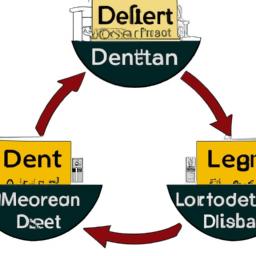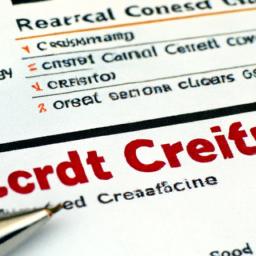Should I Get a Debt Consolidation Loan?
Dealing with multiple debts can be overwhelming, leaving you wondering if there’s a way to simplify your financial obligations. That’s where debt consolidation loans come into play. But before you dive into this option, it’s crucial to understand what it entails and make an informed decision. In this article, we’ll unravel the concept of debt consolidation loans and discuss why it’s important to approach them wisely.
Understanding the Concept of Debt Consolidation Loans
Debt consolidation involves combining multiple debts into one, allowing you to make a single monthly payment instead of juggling various due dates and amounts. By taking out a debt consolidation loan, you can pay off your existing debts and focus on repaying a single loan. This streamlined approach aims to provide convenience and potentially improve your financial situation in the long run.
Importance of Making Informed Decisions Regarding Financial Obligations
When it comes to your finances, knowledge is power. Making well-informed decisions regarding debt consolidation loans ensures that you choose the right path for your specific circumstances. It’s crucial to weigh the pros and cons, understand the potential impact on your credit score, and assess the overall cost of the loan. By doing so, you can navigate the world of debt consolidation with confidence and set yourself up for a brighter financial future.
As we delve further into this topic, we’ll explore the pros and cons of debt consolidation loans, factors to consider before getting one, and alternative strategies that may suit your needs. So, let’s embark on this journey together and discover whether a debt consolidation loan is the right choice for you.
Stay tuned for the upcoming sections where we’ll uncover the benefits and drawbacks of debt consolidation loans. We’ll also explore the factors you should consider before making a decision. Remember, knowledge is key, and understanding all aspects of debt consolidation will empower you to make the best choice for your financial well-being. So, let’s dive in!
Pros of Debt Consolidation Loans

Streamlining Multiple Debts into a Single Monthly Payment
One of the significant advantages of opting for a debt consolidation loan is the ability to streamline multiple debts into a single, more manageable monthly payment. Instead of keeping track of various due dates, interest rates, and payment amounts, you’ll only need to focus on repaying one loan. This simplification can alleviate the stress of managing multiple creditors and help you stay organized.
Potential for Lower Interest Rates and Reduced Monthly Payments
Another enticing aspect of debt consolidation loans is the potential for lower interest rates and reduced monthly payments. When you consolidate your debts, you may be able to secure a loan with a lower interest rate than what you were previously paying on individual debts. A lower interest rate translates into savings over time and can free up funds to allocate towards other financial goals or expenses.
Furthermore, by extending the repayment period through a debt consolidation loan, you may be able to lower your monthly payments. This can provide much-needed breathing room in your budget, allowing you to catch up on other financial obligations or build up an emergency fund.
Easier Budgeting and Financial Management
Managing your finances becomes more straightforward with a debt consolidation loan. Instead of juggling multiple payments and due dates, you’ll have a clear overview of your monthly obligation. This clarity allows you to create a realistic budget and stay on top of your financial commitments. By having a single payment to focus on, you can allocate your resources more efficiently and plan for the future with greater confidence.
In the next section, we’ll explore the potential drawbacks of debt consolidation loans, ensuring you have a comprehensive understanding of this financial option. Remember, while the benefits are enticing, it’s essential to consider the cons as well to make an informed decision. So, let’s dive into the potential drawbacks together!
Cons of Debt Consolidation Loans

While debt consolidation loans offer several advantages, it’s important to consider the potential drawbacks they may entail. Let’s explore some of the cons associated with these loans to help you make an informed decision.
1. Possible Requirement of Collateral for Secured Loans
In some cases, debt consolidation loans may require collateral, such as your home or car, to secure the loan. This means that if you fail to make payments, the lender has the right to seize your collateral as repayment. While secured loans may offer lower interest rates, the risk of losing your valuable assets should be carefully considered before opting for this type of debt consolidation.
2. Potential for Longer Repayment Periods and Higher Overall Interest Costs
Consolidating your debts into a single loan may result in a longer repayment period compared to individual debts. While this can reduce your monthly payments, it also means that you’ll be paying interest for a longer duration. As a result, the overall interest costs may be higher in the long run, even if the interest rate on the consolidation loan is lower. It’s crucial to calculate the total cost of the loan and determine if the benefits outweigh the extended repayment period.
3. Impact on Credit Score and Eligibility for Future Loans
Consolidating your debts can have an impact on your credit score. When you apply for a debt consolidation loan, it results in a hard inquiry on your credit report, which may temporarily lower your score. Additionally, if you close your previous credit accounts after consolidating your debts, it can affect your credit utilization ratio, which is an important factor in determining your creditworthiness. Moreover, if you miss payments or default on the consolidation loan, it can further damage your credit score, making it more challenging to obtain future loans or credit.
It’s essential to consider these potential downsides and evaluate whether they outweigh the benefits of consolidating your debts. In the next section, we’ll discuss important factors that you should take into account before deciding to get a debt consolidation loan. Stay tuned to ensure you make the best choice for your financial well-being.
Factors to Consider Before Getting a Debt Consolidation Loan

Assessing Your Current Financial Situation and Debt Load
Before diving into a debt consolidation loan, it’s crucial to assess your current financial situation and understand the extent of your debt load. Take a close look at your outstanding debts, including credit card balances, personal loans, and any other financial obligations. Determine the total amount you owe, the interest rates you’re currently paying, and the monthly payments you’re making.
By evaluating your financial standing, you can gain a clearer understanding of whether a debt consolidation loan is a viable option. Consider factors such as your income, expenses, and overall financial stability. This assessment will help you determine if consolidating your debts will provide the relief you need or if alternative strategies might be more suitable.
Evaluating Interest Rates, Fees, and Terms Offered by Different Lenders
When considering a debt consolidation loan, it’s essential to shop around and compare the interest rates, fees, and terms offered by different lenders. Look for reputable financial institutions that specialize in debt consolidation loans and request quotes from multiple sources. This will enable you to make an informed decision and choose the lender that offers the most favorable terms for your circumstances.
Pay close attention to interest rates, as they will directly impact the overall cost of the loan. Lower interest rates can potentially save you money in the long run. Additionally, consider any fees associated with the loan, such as origination fees or prepayment penalties. Evaluating these factors will help you determine the true cost of the loan and ensure it aligns with your financial goals.
Understanding the Impact on Credit Score and Future Borrowing Potential
It’s important to recognize that taking out a debt consolidation loan can have an impact on your credit score. When you apply for a new loan, it may result in a temporary dip in your credit score. However, if you make timely payments and manage your finances responsibly, a debt consolidation loan can ultimately improve your creditworthiness over time.
Additionally, consider how a debt consolidation loan may affect your future borrowing potential. While it can provide immediate relief and simplify your debt management, it’s crucial to consider the long-term implications. Some lenders may view a debt consolidation loan as a sign of financial instability, which could impact your eligibility for future loans or credit.
By carefully considering these factors, you can make an informed decision about whether a debt consolidation loan is the right choice for you. In the next section, we’ll explore alternative strategies that may suit your needs, so keep reading to explore all your options.
Alternatives to Debt Consolidation Loans
Exploring Other Debt Repayment Strategies
When considering managing your debts, debt consolidation loans may not be the only solution. Other strategies like the snowball or avalanche methods can offer alternatives worth exploring.
Snowball Method
The snowball method involves paying off your debts in order from the smallest balance to the largest. By focusing on the smallest debt first, you gain a sense of accomplishment and motivation to tackle the remaining balances. As you pay off each debt, you can allocate the freed-up funds towards the next debt, creating a snowball effect that gains momentum over time.
Avalanche Method
The avalanche method, on the other hand, focuses on prioritizing debts based on their interest rates. Start by paying off the debt with the highest interest rate first, while making minimum payments on the others. Once the highest-interest debt is cleared, redirect the funds towards the debt with the next highest interest rate. This method minimizes the overall interest paid, potentially helping you become debt-free faster.
Utilizing Balance Transfer Credit Cards or Personal Loans
Balance transfer credit cards and personal loans are additional alternatives to debt consolidation loans.
Balance transfer credit cards allow you to transfer your existing credit card balances to a new card with a lower interest rate or a promotional 0% APR period. By taking advantage of this offer, you can consolidate your credit card debts and potentially save on interest charges. However, it’s important to be mindful of any balance transfer fees and the duration of the promotional period.
Personal loans can also be used to consolidate debts. These loans are unsecured, meaning you don’t need to provide collateral. They can be obtained from banks, credit unions, or online lenders. Personal loans often come with fixed interest rates and terms, providing you with a clear repayment plan. Before proceeding, compare offers from different lenders to secure the best terms and rates.
Seeking Professional Financial Advice or Credit Counseling
If you’re feeling overwhelmed by your debts and unsure which path to take, seeking professional financial advice or credit counseling can provide valuable guidance. These experts can assess your unique situation, offer personalized recommendations, and help you create a realistic and effective debt repayment plan. They can also negotiate with creditors on your behalf, potentially lowering interest rates or negotiating more manageable payment terms.
Remember, debt consolidation loans are not the only solution available to you. Exploring alternative strategies like the snowball or avalanche methods, utilizing balance transfer credit cards or personal loans, and seeking professional advice can present viable options for managing your debts. By considering these alternatives, you can choose the approach that aligns best with your financial goals and circumstances.
Conclusion
After considering the pros and cons, analyzing your financial situation, and exploring alternative options, you may still find yourself asking, “should i get a debt consolidation loan?” Well, the answer lies within your unique circumstances and goals.
Debt consolidation loans can be a valuable tool for simplifying your debts and potentially reducing interest rates and monthly payments. They offer convenience and can help you regain control of your financial situation. However, it’s essential to approach this decision with caution and thoroughly evaluate the terms, interest rates, and impact on your credit score.
Remember, making informed decisions regarding your financial obligations is crucial. Consider seeking professional advice from a financial advisor or credit counselor who can guide you through the process and help you make the best choice for your situation.
At kizi5.top, we understand the importance of making wise financial decisions. We hope this article has provided you with valuable insights into the world of debt consolidation loans. Remember, everyone’s financial journey is unique, and what works for one person may not work for another. Take the time to assess your options, weigh the pros and cons, and make a decision that aligns with your financial goals.
So, should you get a debt consolidation loan? Only you can answer that question. But armed with the knowledge and information shared in this article, you are well-equipped to make an educated decision. Take control of your financial future and choose the path that leads you towards financial freedom.
Remember, at kizi5.top, we are here to help you navigate your financial journey and provide you with the resources you need to make informed decisions. Stay tuned for more informative articles and tips to empower you on your path to financial well-being.
Bolded once: kizi5.top
Conclusion: So above is the Should I Get a Debt Consolidation Loan? article. Hopefully with this article you can help you in life, always follow and read our good articles on the website: kizi5.top


